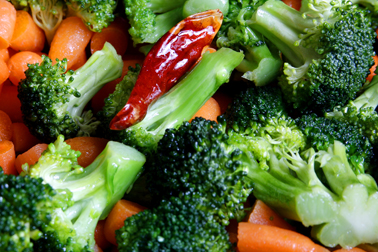
Nutritionists have long been telling us about the importance of green, leafy foods to a healthy diet. They are all-round health boosters that should be on our plates at least once a day. Food scientists and medical researchers have been backing up these claims. We know that broccoli is one of the best green vegetables to include in a healthy diet, but there are others that are jus t as good for us. Kale is less commonly seen on the menu but it’s a green veg worth buying and trying if you haven’t had it before.
Like broccoli, kale is a member of the brassica family of vegetables. Other familiar brassicas are cabbage, cauliflower and brussels sprouts. Kale is in fact a kind of cabbage, but with spreading leaves rather than the tightly curled head of the familiar cabbage varieties. It’s a vegetable that was more widely known and grown in the past than today, though it remains popular in many world cuisines. Kale’s comeback may be at hand, partly due to its remarkable nutritional properties and benefits.
Kale is wonderfully rich in all sorts of essential and desirable nutrients. First of all, it’s rich in vitamins C and K. We all know how important Vitamin C is, and that unlike many animals we don’t produce it ourselves, but must get it by eating a healthy diet. Vitamin K is important for blood clotting and various metabolic processes.
Kale is also particularly rich in some less familiar nutrients. Beta carotene is what makes carrots orange. As well as being an antioxidant, it’s bound up with vitamin A, which amongst other things is essential for good eyesight. Lutein and zeaxanthanin are also important for eyesight. They are known as xanthophylls and, like other vitamins, have to be accessed through dietary means. A chemical called indole-3-carbinol may help in DNA repair and in reducing arterial disease.
Perhaps the biggest bonus of kale for a healthy diet is that it contains sulforaphane. This is a compound that has caused some excitement because it has been identified as having anti-cancer and anti-diabetic properties. It may also help in reducing the damage caused to the skin by sunlight, and UV radiation that can cause skin cancer. These conditions are all common today and foods that protect us from them are obviously potentially important in a healthy diet.
Kale is a versatile vegetable. Young tender shoots are great in salads and Asian-style stir fries. With potatoes and ham it’s a key ingredient of the famous Irish dish called colcannon. The Japanese wised up to the benefits of kale in the 1940s and drink its juice as a health drink (though it tastes notoriously foul). Including it in your diet could bestow considerable health benefits, so it’s well worth putting it on your shopping list.

